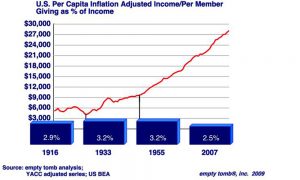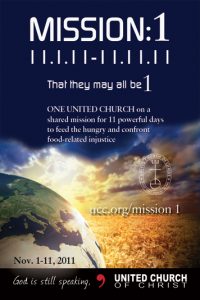Adam Walker Cleaveland is Minister for Youth and Young Adults at Asbury United Methodist Church in Livermore, CA. At 31, he is among the younger voices of note in the emerging church movement and a co-founder of Presbymergent. Adam is a candidate in the Presbyterian Church (USA) ordination process as well as a prolific and thoughtful blogger, writing primarily on his sites: PomoMusings and DazedDad. To connect with him, view his flickr stream, follow him on Read More …
Discipleship
Truly Welcoming Visitors on Easter (#0342)
In almost every congregation, Easter is the most attended Sunday morning of the year. Many congregations feature additional services to provide these religious consumers with the greatest number of options possible and to ensure that there is room (especially parking and seating) for everyone. Most parishes seek to do what they can to ensure visitors have a positive experience and are likely to visit again. Toward that end, I suggest: Providing an extravagant welcome is not Read More …
Should Clergy-Scholars Lead the Church? (#0339)
Donald Miller is the author of several books including A Million Miles in a Thousand Years: What I Learned While Editing my Life (2009) and Blue Like Jazz: Nonreligious Thoughts on Christian Spirituality (2003). To connect with him, read his blog, like him on Facebook, or follow him on Twitter. Earlier this month he posted, "Should the Church be Led by Teachers and Scholars?" In the article he questions the centuries old norm of the church being led by Read More …
The Most Popular “Church Blogs” or Are They? (#0332)
Kent Shaffer is the founder of ChurchRelevance.com, an online resource created to inspire and train ministers to be more relevant and effective, and a volunteer strategist for lifechurch.tv. He recently published his updated list of the "Top 200 "church blogs." His list intrigues me for several reasons, beginning with his methodology, which he describes as follows: Several hundred blogs are reviewed in a preliminary screening to determine if their statistics are competitive enough to be Read More …
Is Tithing Required? (#0330)
Cnn.com religion editor Dan Gilgoff shared the findings of a recent informal survey of the National Association of Evangelicals in a blog post. He writes: The survey, conducted by the National Association of Evangelicals (NAE) among its 100-member board of directors, found that 42% of evangelical leaders believe the Bible requires tithing, while 58% do not . . . The National Association of Evangelicals, the nation’s biggest evangelical umbrella organization, would not say how many of its Read More …
What the Church Is and What it Should Be (#0328)
Jason Fairbanks, pastor of First Congregational Church (United Church of Christ) in Lake Worth, Florida, recently wrote a series of posts on his blog about what the church is and what it should be. In making his case for what the church should be he offered the wisdom given him by his father: A church is a hospital for those that find themselves hurting and on our doorstep. It is these that we have the opportunity to receive and to love. A church is a greenhouse for those interested in Read More …
Mission 1: Feeding the Hungry and Confronting Food-Related Injustice (#0323)
The one million member United Church of Christ may be best known by its incredibly successful multi-year "God is still speaking" campaign. Perhaps you have heard the message: No matter who you are or where you are on life’s journey, you are welcome here. We believe in extravagant welcome. (For more information read The Language of God and Uniquely UCC then watch some of the original television commercials.) The United Church of Christ originated as the result of mergers that Read More …
Radical Inclusivity (#0321)
Christian leaders make news headlines on a daily basis, but are rarely portrayed as open minded or inclusive. Jonathan Devin's "Radical Preachers Buck Mainstream Christianity" tells the story of a growing interdenominational group of pastors known as Outlaw Preachers who are bound together by their shared belief in radical inclusivity. Founded in 2008, the group has grown to 300 members and recently held their first conference, which was attended by persons representing Read More …
Reshaping Seminary Education (#0315)
Earlier this month, I wrote "A Shift in Theological Education" to highlight the shift in seminary education from primarily an on campus face-to-face learning experience to one that includes hybrid (using both face-to-face and online components) or online courses. This shift mirrors what has happened in higher education more generally where online enrollment grew 20% over the most recently available seven year period from 9% to 29%. Interestingly, The Reverend Dr. Frederick W. Read More …
Do you Attend a Living Church or a Dying Church? (#0312)
Sam Trumbore is a Unitarian Universalist (UUA) pastor who currently serves as minister of the First Unitarian Universalist Society of Albany (New York). Previously, he was Unitarian Universalist Fellowship of Charlotte County, Florida. Recently he wrote a piece contrasting the experiences of living churches with those of dying churches. This article was originally published in the newsletter of a Charlotte county church: Pilgrim United Church of Christ. More recently it Read More …









